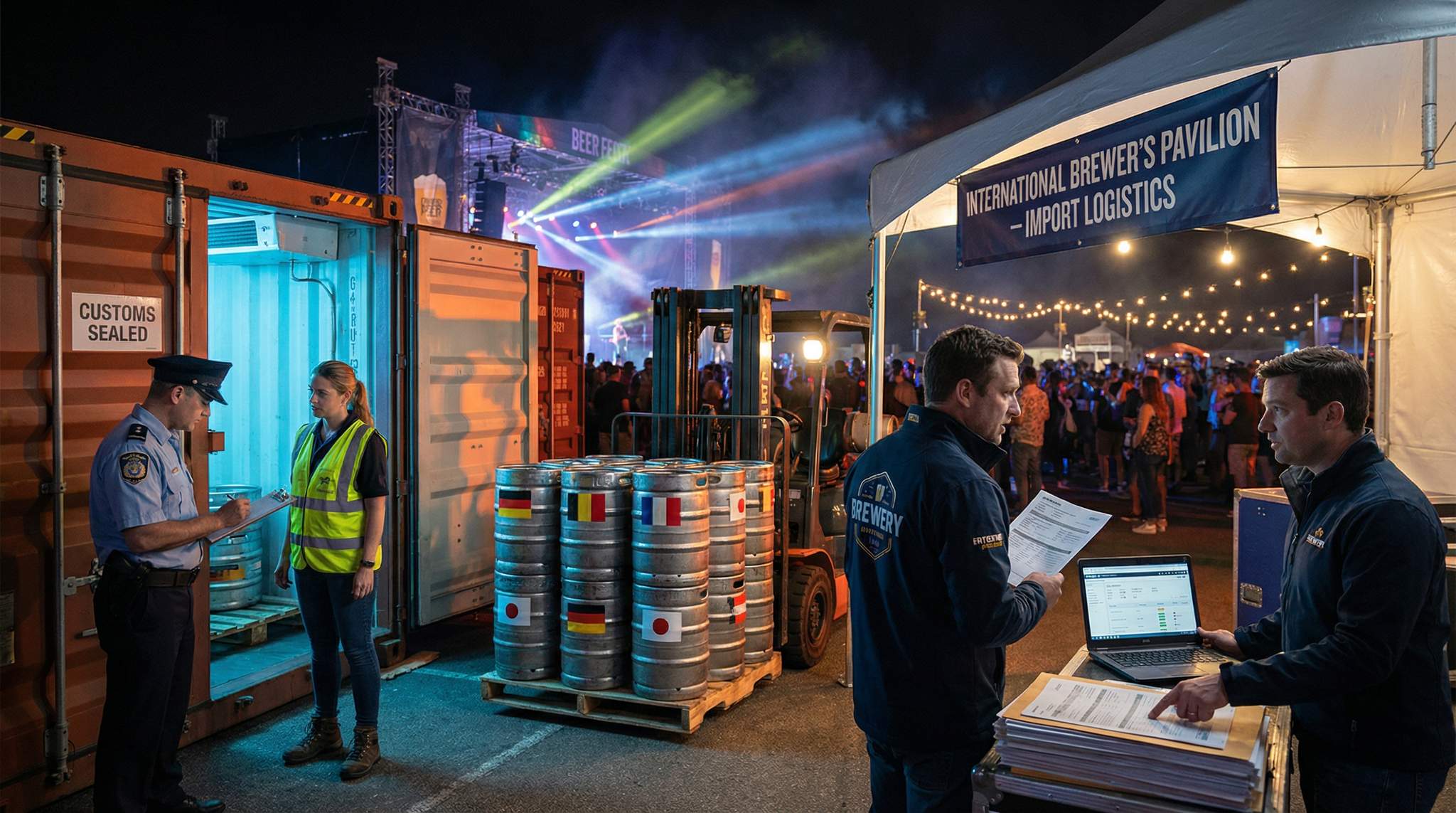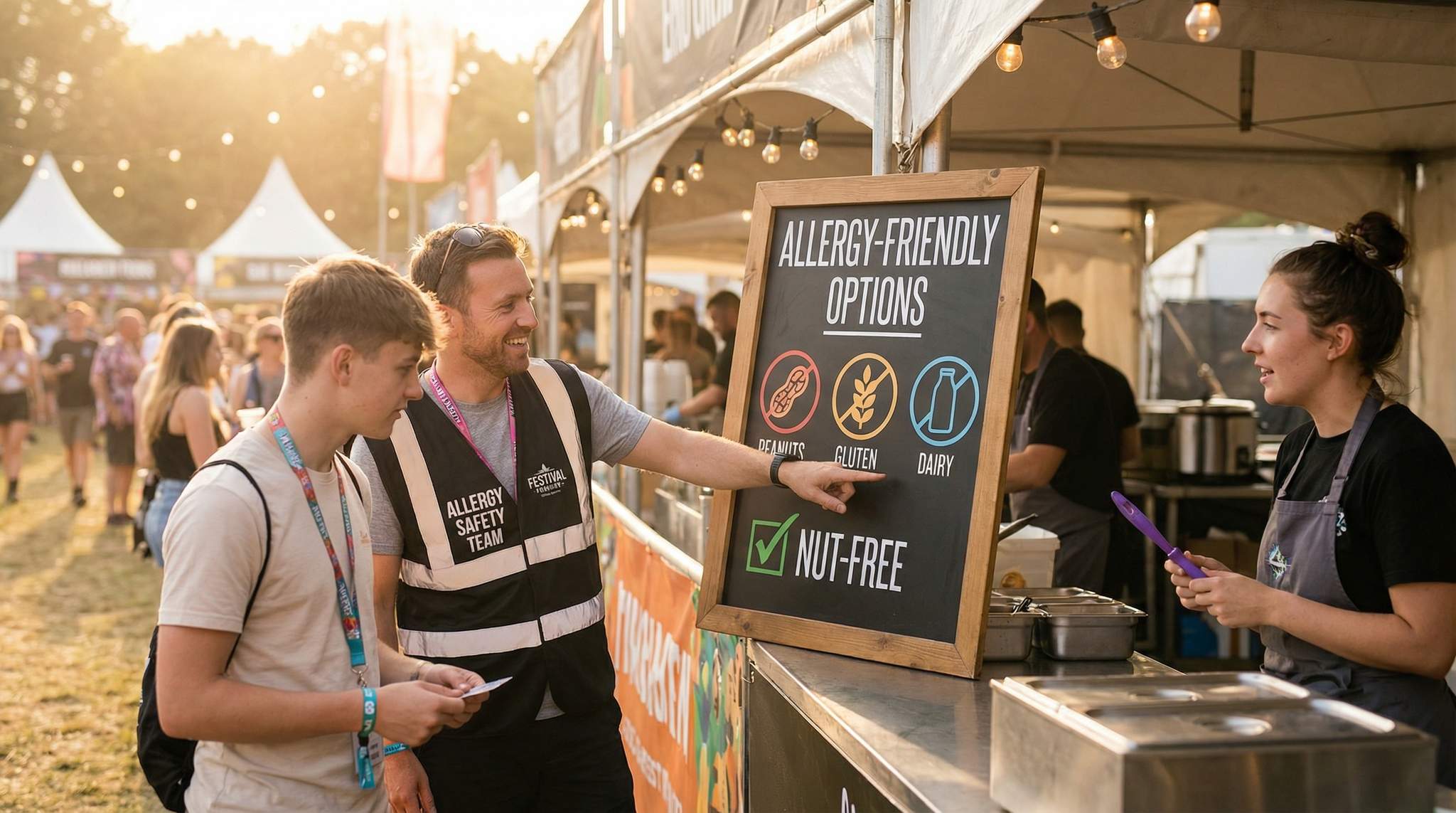Bringing international breweries to a beer festival adds an exciting global flair and draws in crowds eager to taste rare brews. However, turning a local festival into a world-class event featuring beers from abroad isn’t as simple as inviting brewers and ordering kegs. Alcohol import, customs regulations, and compliance hurdles can become complex roadblocks. A seasoned festival producer knows that careful planning, legal know-how, and attention to detail are critical to ensure foreign beers flow smoothly on tap. From securing import permits to maintaining a perfect cold chain, every step must be managed meticulously so that breweries from overseas are showcased at their best and regulators remain fully comfortable.
Navigating Import Permits and Licenses
Every country, and often each region within, has stringent laws governing alcohol imports. Before a drop of foreign beer is poured, the festival must have legal permission to bring those brews into the country or state. This usually means working with licensed importers or obtaining special temporary import permits. Many seasoned organizers partner with a local distributor or brewery that holds an import license – essentially designating an “importer of record” who can legally receive and handle the beer shipment. In some cases, especially for one-off events, governments offer event-specific import permits.
For example, in the United States, certain states provide a temporary manufacturer event permit for out-of-state breweries to pour at festivals. This kind of permit can allow a foreign brewery to bring in a limited quantity (e.g., a few hundred gallons) for a short period, bypassing lengthy full-scale import licensing. It’s critical to research the host location’s regulations: a festival in California, USA, will have different rules than one in Ontario, Canada or Queensland, Australia. Some U.S. states require the festival to be associated with a local brewery or retailer who sponsors the event license and even assumes responsibility for taxes. Meanwhile, countries like India and those in the European Union mandate that only licensed entities import alcohol, so an overseas brewery would need to route their product through an approved importer. No matter the locale, start the conversation with authorities early – often months in advance – to understand what specific permit or license is needed to legally bring in beers from abroad.
Customs Duties and Tax Handling
Importing beer means dealing with customs and excise taxes. When beer crosses borders, duties (tariffs on imports) and alcohol excise taxes are usually due. As a festival organizer, you need to factor these costs into your budget and logistics. Determine up front who will cover the duties and taxes – the festival, the participating breweries, or a combination. Often, festivals cover import costs as a courtesy to international brewers, effectively treating it as part of the cost of providing a diverse lineup. Be aware that duties and taxes can be significant, especially for larger volumes or higher-alcohol beers (some jurisdictions tax alcohol by volume or percentage ABV). Work with your customs broker (more on brokers soon) to get an estimate of the taxes per volume of beer so there are no nasty surprises at the border.
In some cases, there are ways to minimize or simplify the tax burden. For instance, certain countries provide duty exemptions or rebates for beer brought in solely for sampling at events. Singapore, for example, has an Approved Wine and Beer Event scheme where exhibitors can import a small amount per label with duty and GST waived, as long as the beverage is only for sampling and the event is officially recognized. While not all countries have such perks, it’s worth researching if any special event exemptions exist. In the European Union, moving beer from one member country to another requires handling excise duty either through a bond or via the EU Excise Movement and Control System (EMCS). If you plan to bring kegs from, say, Germany to a festival in Spain, you might transport them under duty suspension and then pay the Spanish excise upon arrival. Always coordinate with customs authorities and consider engaging a customs broker to help properly declare the shipments. And remember: if any imported beer is left over post-festival, regulations often demand that it either be re-exported, handed over to a licensed entity, or destroyed under supervision. Plan for this in advance so you don’t accidentally violate customs laws by storing or consuming leftover foreign beer outside of the event’s scope.
Label Compliance and “Label Equivalency”
A can or bottle from overseas might have a beautiful label in its native language, but will it satisfy local labeling laws? Every country has specific requirements for alcohol labels – from health warnings and ingredient lists to alcohol by volume and importer information that must be displayed. “Label equivalency” refers to ensuring that the foreign beer’s packaging information meets the host country’s standards, even if not identical in format.
Planning a Festival?
Ticket Fairy's festival ticketing platform handles multi-day passes, RFID wristbands, and complex festival operations.
Plan ahead to review each beer’s label well before shipping. Identify what might be missing or non-compliant. For example, beers imported into the United States must have a government warning about alcohol consumption and must go through the TTB’s Certificate of Label Approval (COLA) process if they will be served to the public (even at a festival). If an international brewery’s label hasn’t been approved by the U.S. TTB, you (or your importer partner) should apply for COLA approval months in advance. In some cases where the beer is not being sold and only given as samples, organizers might seek a COLA waiver, but this is entirely at the discretion of regulators and not guaranteed. It’s safer to assume every distinct beer label needs approval.
In other regions, compliance could mean translation requirements. If you’re hosting a festival in France, by law certain information must appear in French – you might need to affix a sticker with the required details (allergens, volume, local importer address, etc.) onto each bottle or can. Australia and New Zealand recently introduced strict labeling rules (like mandatory pregnancy warnings on alcohol containers), so an imported beer without the proper icon and text would need an over-label with that warning before it can be served. Japan requires that a label in Japanese be applied, including the importer’s name and address and a caution statement, for any alcohol brought into the country. Coordinate with the breweries to either have them adjust their labels for the event or plan for a stickering session when the beer arrives. Keep extra copies of any translations or certificates on hand at the festival in case inspectors want to verify that each product’s labeling is compliant. Cutting corners here is dangerous – regulators have been known to impound products or stop service mid-event if they find bottles or kegs that don’t meet labeling laws.
Working with Customs Brokers and Shipping Logistics
International shipping of beer is not as simple as mailing a package. Engaging a qualified customs broker or freight forwarder experienced in alcoholic beverages is one of the best investments you can make for a smooth process. A customs broker will handle the preparation and submission of all the necessary documentation to import the beer legally. This includes customs declarations, providing detailed commercial invoices and packing lists, and ensuring all import permit numbers or licenses are correctly referenced. They act as your advocate and liaison with border agencies, which is invaluable if any issues arise in transit.
When coordinating logistics, consider consolidating shipments to simplify customs clearance. If you have multiple breweries from one country or region, it can be efficient to collect all their beer and ship it together. For example, if you have five breweries in Europe sending beer to your festival in Mexico, combining their consignment into one refrigerated container can reduce per-unit shipping costs and streamline the import paperwork into a single customs entry. Work with your breweries to set a clear shipping timeline. International transit can be slow – sea freight might take weeks (e.g., 4–6 weeks from Europe to Australia), and even air freight can face delays due to customs backlogs or flight availability. Advise breweries of a “latest ship date” to ensure their beer arrives with buffer time before the festival. It’s wise to have the beer arrive at least a couple of weeks early (or more, for sea freight) in the destination country. That cushion allows for any customs hold-ups or unforeseen delays to be resolved without missing the festival date. Just make sure you have proper cold storage (refrigerated warehouse or cool-room) to keep the beer in prime condition during that buffer period.
Don’t forget about local logistics after customs clearance. Once the beer has entered the country, you’ll need to transport it to the festival site. Depending on local laws, you might have to use a licensed alcohol distributor for the transport; in some places, only licensed entities can move alcohol from warehouses to retail or event locations. In other cases, your team can do it directly, but you’ll still want a secure and possibly bonded transport. Plan out the trucking or delivery schedule so that beer arrives on-site fresh and ideally chilled. If your festival is large, coordinate a loading/unloading plan – hundreds of kegs showing up on festival morning needs tight organization.
Transportation Insurance and Risk Management
Shipping beer across the world involves risk – shipments can get lost, damaged, or spoiled. Transport insurance is not optional; it’s essential. Cargo insurance should cover the value of the beer and freight, protecting you or the breweries if something goes awry in transit. Make sure the insurance policy explicitly covers spoilage due to temperature excursion if you are shipping refrigerated beer, as well as breakage if shipping bottles. There have been instances where rare craft beer shipments arrived undrinkable because a refrigeration unit failed or customs delays left the beer in a hot warehouse for days. With insurance, at least the cost can be recovered, but without it, everyone loses out.
Need Festival Funding?
Get the capital you need to book headliners, secure venues, and scale your festival production.
Beyond cargo insurance, verify whether your event liability insurance covers serving imported alcohol. In many jurisdictions, festival insurance policies cover alcohol-related incidents (like over-consumption liability) as long as you are properly licensed to serve. Ensure your coverage extends to all beverages, regardless of origin. Additionally, some foreign breweries might ask you to sign an agreement regarding responsibility for their product once it’s shipped. Be clear on terms: when does liability transfer? Often, once the beer leaves the brewery, the festival (or its designated importer) becomes responsible for it through to the event. Clarity on these points keeps relationships smooth.
Lab Testing and Compliance Assurance
Regulatory agencies in some countries require lab testing of alcoholic beverages, particularly for imported products that haven’t been sold locally before. These tests can verify alcohol percentage, check for contaminants, and ensure no prohibited ingredients or additives are present. As a festival organizer bringing in beers that may be completely new to the market, be prepared for this possibility. For example, certain Canadian provinces, such as Ontario, mandate quality testing through their liquor control board’s laboratories for any new beer product entering the market – even if it’s just a one-time appearance at a festival. The same can apply in parts of Asia and the Middle East, where health and customs authorities might hold beverages for sampling and testing before release.
To navigate this, ask early on if the local authorities require any Certificates of Analysis (COA) or lab results for the beer. It might save time if breweries can ship samples ahead for testing, or provide an official analysis from a reputable lab in their home country. Some breweries, especially larger ones, routinely do quality lab tests and can share those reports. However, regulators may insist on testing in-country at an accredited lab. Budget both money and time for this scenario – lab tests can take a few days to a couple of weeks depending on complexity. Also confirm if any specific ingredients are disallowed or restricted. For instance, certain artificial colorings or high levels of caffeine (in alcoholic beverages) could pose issues in some markets. If a brewery is bringing an unconventional brew (say, a beer with CBD, or one aged with animal-based ingredients), double-check compliance with local food and drink regulations to avoid confiscation at the border. Ultimately, demonstrating a proactive approach to safety – through lab testing and documentation – will make regulators far more comfortable with the foreign beers being served.
Maintaining the Cold Chain (Quality Preservation)
A beer’s quality can be drastically affected by temperature fluctuations during transport and storage. Many craft breweries take pride in unpasteurized, fresh flavors that are especially sensitive to heat. To showcase foreign breweries properly, you must treat their beer as carefully as they do. This means maintaining a “cold chain” from the brewery all the way to the festival tap. Whenever possible, ship beer in refrigerated containers or with cooling packs (for smaller shipments). If using ocean freight, invest in a refrigerated (reefer) container and set it to the appropriate temperature (usually around 2-4°C for beer, unless the beer is bottle-conditioned and can handle slightly warmer). With air freight, request a climate-controlled service or pack the beer with insulation and ice packs. Plan the quickest route feasible – a direct flight is preferable to one with a long layover where beer might sit on a hot tarmac.
Once the beer arrives in the destination country and clears customs, immediate refrigerated storage is a must. Ideally, have access to a cold warehouse or a walk-in cooler through a local partner (some distributors or breweries might help by providing storage space). Keep kegs and cases cold right up until they are transported to the festival.
At the festival itself, have a strategy to keep beer cool even as it’s being served. This might mean using jockey boxes (coil draft systems chilled with ice) for kegs, keeping spare kegs on ice or in fridges, and shading or insulating any bottles on display. It’s not just about avoiding skunked or flat beer – presenting a beer at its intended quality is a mark of respect to the brewery. Imagine flying beer from Belgium to a festival in New Zealand only to serve it warm and foamy because of poor temperature control; that would disappoint attendees and reflect poorly on festival management. On the flip side, a well-maintained cold chain means patrons get to taste the beer exactly as the brewer intended, and the brewery’s reputation for quality remains intact globally.
Success Stories and Lessons Learned
To illustrate how all these pieces come together, consider a real-world inspired scenario. A craft beer festival in California decided to invite breweries from ten different countries, aiming to offer a truly international tap list. The organizers partnered with a local import-distribution company that specialized in craft beer. This partner handled the heavy lifting of coordinating with each foreign brewery on shipping paperwork and consolidated all the shipments. Because the festival gave six months lead time, there was ample time to secure TTB label approvals for the 30+ foreign beers and obtain a temporary event import permit from the state alcohol board. Come festival time, all beers arrived on schedule, cleared customs without a hitch, and were kept in cold storage at a local brewery’s warehouse until the event. Attendees got to enjoy fresh beer from around the world, and regulators who visited the festival saw a well-organized, fully compliant operation – every tap had a tag listing its import lot number and all taxes were prepaid. This successful showcase was the result of diligent planning and respect for the legal process.
Contrast that with a cautionary tale: A smaller festival in Southeast Asia ambitiously invited a few European brewers but underestimated the import requirements. They assumed the brewers could just fly in with a few kegs as “luggage” and pour at the event. Unfortunately, customs at the airport seized those kegs because they lacked proper import permits and documentation. The beer never made it to the festival, leaving brewers and attendees disappointed. The lesson? Even for small-scale collaborations, never assume you can bypass formalities – always check if a temporary import license or some prior approval is needed, even for what might seem like “personal” quantities. Another festival in Europe learned about cold chain the hard way when a delayed shipment of American IPAs sat for days in a warm customs depot. By the time it was released, the beer had noticeably deteriorated in flavor. Since then, that festival only ships beer via refrigerated methods and works closely with customs to expedite processing of perishable shipments. Mistakes can happen to even experienced organizers, but each challenge is an opportunity to improve processes for next time.
Ensuring Regulators Stay Comfortable
Throughout this entire journey of bringing in international brews, maintaining a transparent and cooperative relationship with regulators is paramount. From alcohol control boards to customs officers, these officials need to feel confident that your festival isn’t flouting any laws or risking public safety. Always err on the side of over-communicating your plans. Often, inviting the local authorities to review your festival setup ahead of time can pay dividends. Show them your meticulous records – copies of import permits, tax payment receipts, lab results, label approvals, and so on. When they see that you have done your homework, they are more likely to trust you and perhaps even enjoy the festival themselves knowing it’s well-regulated.
It’s wise to designate a point person on your team to liaise with regulators. This could be your head of operations or even a compliance officer if you have one. Their job is to ensure all the paperwork is in order and be ready to answer questions or furnish documents quickly during the event. For instance, if an inspector asks for proof that duty was paid on a particular foreign keg, you should be able to produce the customs clearance paperwork or tax stamp record immediately. Staying in the good graces of regulators also means abiding by the spirit of the law, not just the letter. Don’t try to game the system by, say, mis-declaring the volume of beer to save on taxes or sneaking in extra cases beyond what your permit allows. The short-term gain is absolutely not worth the long-term risk of being blacklisted from holding future events or facing legal penalties.
Finally, after the festival, follow through on any required compliance tasks. If you imported under a temporary permit that requires unused product to be disposed of, make sure you document the disposal or ship the leftovers back as required. If any deposit or bonds were posted for importation, work on getting those settled or refunded. Send thank-you notes to helpful customs brokers or officials you worked with – it leaves a positive impression for next time. By demonstrating professionalism and respect for the rules at every step, you make it much easier to host international breweries again in the future. Regulators will remember a festival that ran like clockwork and adhered to laws, and they’ll be inclined to approve and support your events down the line.
Frequently Asked Questions
How can international breweries legally participate in foreign beer festivals?
Festivals must work with licensed importers or obtain temporary import permits to bring foreign beer into a country. For example, some U.S. states offer temporary manufacturer event permits for out-of-state breweries, while the EU and India often require routing products through approved importers. Organizers should research specific regional regulations months in advance.
Who pays customs duties and taxes for imported festival beer?
Festival organizers typically determine upfront whether the event or the participating breweries cover import costs, including tariffs and excise taxes. While some countries like Singapore offer duty exemptions for sampling events, most jurisdictions require payment based on volume or alcohol percentage. Organizers must budget for these costs to avoid surprises at the border.
What is label equivalency for imported beer at festivals?
Label equivalency ensures foreign packaging meets host country standards, such as displaying specific health warnings, ingredient lists, or importer details. Organizers must review labels early to secure approvals, like the U.S. TTB’s COLA, or apply stickers for translation requirements in countries like France and Japan to avoid product impoundment.
How should festivals manage international beer shipping and cold chain logistics?
Organizers should engage a customs broker and consolidate shipments in refrigerated containers to maintain a temperature of 2-4°C. Shipping timelines need a buffer, such as allowing 4-6 weeks for sea freight from Europe to Australia. Continuous cold storage from arrival through the event is critical to preserve quality and prevent spoilage.
Why is transportation insurance necessary for importing festival beer?
Cargo insurance protects against financial loss from lost, damaged, or spoiled shipments during transit. Policies should explicitly cover temperature excursions for refrigerated beer and breakage for bottles. Without this coverage, organizers cannot recover costs if customs delays or equipment failures render rare craft beer shipments undrinkable before the event.
When is lab testing required for international beer festival imports?
Regulatory agencies in regions like Ontario, Asia, and the Middle East often mandate lab testing for products new to the market to verify alcohol percentage and ingredients. Organizers should budget time and money for Certificates of Analysis (COA) or in-country testing to ensure no prohibited additives or restricted ingredients are present.





